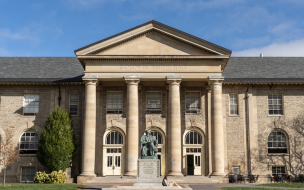What are the absolute key facts about the St.Gallen MBA that all applicants should know about?
The St.Gallen MBA is unique in many ways but most of these are driven by our location in eastern Switzerland, one hour outside of Zurich. St.Gallen has long been regarded as the most prestigious business in the German part of Europe, but a key advantage for us is that we are the only full-time MBA in the German part of Switzerland.
Being only one hour from Zurich puts a significant number of multinational headquarters on our doorstep. This is key for our MBA students as many of them target jobs in Switzerland and each year around 60% of the class secure employment here. This is also a huge benefit when it comes to corporate involvement in the MBA as we have a strong connection with many of these companies and are able to regularly secure the support of senior decision makers who come and work with the class on case studies involving their companies.
How many MBAs do you admit each year?
We admit 40 MBAs each year. Our long term strategy is to maintain a class of approximately 40 full-time MBA students and to provide a high level of personal career guidance and academic support.
What's the typical profile of a St Gallen MBA?
A typical St.Gallen MBA is an internationally experienced self-starter. Our students have on average 6 years experience and 30 years in age, but the most consistent factor is their experience working overseas and willingness to use their own initiative in starting projects and develop their networks.
Can you provide some examples of the types of jobs St Gallen MBAs have gone on to do?
Four core areas recur in postgraduate employment: consulting jobs, both at top-name consulting companies, but also increasingly as internal consultants in finance or industrial companies; finance jobs, at some of the world's most recognizable banks in Switzerland's strong banking sector, but also many in corporate finance; industrial jobs in business development, strategy or process management; and lastly pharma jobs primarily in companies such as Roche and Novartis both in business development or corporate finance but also in product management where an existing background exists.
Who are some of the star professors at St Gallen?
Now this is a tough one! Of the 30 professors who teach in St.Gallen almost all are involved in interesting projects, both academic and business, many with international recognition. Probably first choice would be Simon Evenett, a world renowned economist who is quoted almost daily in the world's leading media outlets.
He is a leading academic voice at international trade negotiations and specialises in emerging market economies in the MBA. Second would be Heike Bruch, a recent TedX speaker and specialist in Leadership and Human Resource Management. She is a member of McKinsey's academic sounding board and has published prolifically in areas related to leadership in change processes and organizational behaviour.
What's the best thing about living/ studying in Switzerland?
The best thing about living in Switzerland? Each person is going to give you a different answer to that, but for me it has to be the mountains. It doesn't matter whether it is winter sport season or just going to fondue at some remote restaurant high up in the snow. And the mountains are great irrespective of the season. Spring and Summer are excellent for stress relief - the ability to go for a day trip hiking away from mobile phone signals!
You've studied Chinese - does this help you interact with applicants/ students from China?
It certainly helps to speak languages in general, but Chinese is certainly a useful one. It doesn't matter where you go, speaking some of the local language helps to reach out to locals and to build a bridge to applicants. Much of my work is about connecting with people and understanding their point of view, so anything that helps this is an advantage.
You have a lot of LinkedIn connections - do you think it's important to be well connected in your job?
This has exploded over the last few years. When I started in this industry, 10 years ago, this sort of network didn't even figure in the marketing portfolio. Now, it is a key way for me to stay in touch with MBA alumni, and to connect with people in other MBA schools to better stay in touch with market trends.
What do you think is the most exciting thing happening in the business school world at the moment?
The most exciting thing has to be the social media connection. Almost everyone is signed up to something and anyone who thinks they know what direction it is leading us in or how it is really changing the world is just lying to themselves.
The reality is that only a small percentage are really pro-active in these networks, but as technology improves and further invades our daily life, this will grow along with the opportunities for business schools to reach out to people that they have not been able to reach before.
RECAPTHA :
85
70
ae
ba







